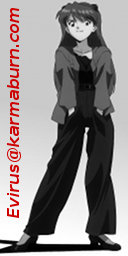|
|
Blog Archives:
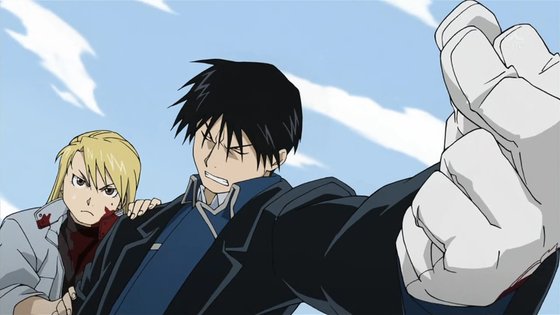
Fullmetal Alchemist: Brotherhood was the best show of Spring 2010.
I can't understand why Fullmetal Alchemist: Brotherhood wasn't more popular. Many fans of the first anime refused to watch it at all, citing unconvincing reasons not to give it a chance. Personally, I suspect one reason they refused to watch it was because at least subconsciously they believed they had "outgrew" it and didn't want to sour nostalgic memories of the enthusiasm they had for Fullmetal Alchemist in their youth.
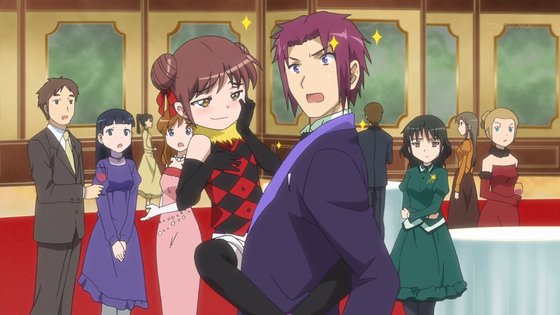
Misato standing in for the homunculus Lust. Misato is dirty.
True, the first 12 episodes did cover a lot of the same territory as the first anime, so it felt like a clip show to those who had watched the previous version, but starting from the episode where they freaking crucify Greed and sink him screaming and hollering into a pool of lava (oops, spoilers), everything is new. You'd think people would be willing to at least give it a chance. There's an entire year's worth of new material, for crying out loud.

How odd. Panthers Stadium looks so much like Dodger Stadium.
Taking second place is the first half of the sixth and final season of Major. I started watching this baseball epic on a goof because I was so dissatisfied with One Outs and how it depicted actual gameplay in the show. I figured I'd try something aimed more toward actual baseball fans. I'm glad I did, because Major has been consistently good and offers the viewer a rare opportunity to follow characters from childhood to adulthood throughout a single mostly unbroken arc. I don't expect non-baseball fans to be as enamored with Major, though.
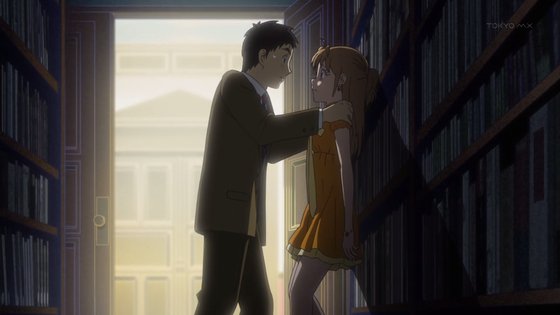
What is it with anime girls and libraries?
B Gata H Kei would have scored a lot higher had it not squandered precious middle episodes fumbling clumsily with Yamada's rival. It's the anime equivalent of not being able to work a bra clasp. However, when all cylinders were firing, B Gata H Kei actually got things moving. It's really refreshing to see anime acknowledging again that sex exists. Compared to his typical Male Protagonist peers, Kosuda is a stud comparable to the likes of James Bond, Sam Malone, and dare I say it...The Fonz, even if he does suffer—as Eddie Murphy put it in Delirious—from occasional difficulties at "finding the pussy."
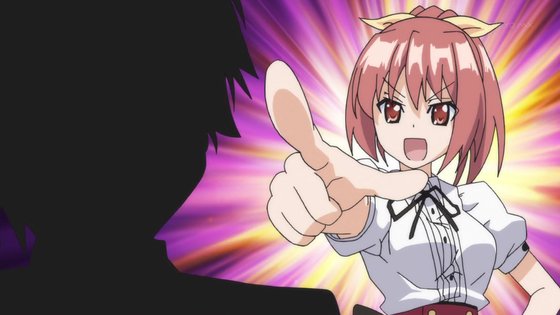
I wasn't expecting to find Minori from Toradora!
in Mayoi Neko Overrun!, to tell you the truth.
Mayoi Neko Overrun! was not a good show, but it had good moments. I also liked its gimmick of changing directors every episode. Thanks to the best tsundere love confession I've ever seen (no, really) in episode three, two solidly brilliant episodes (four and seven), and consistently amusing portions sprinkled throughout (such as bits of the Jenga battle and basically everything Nozomi did as the sole rep for the "bloots" faction of the bloomers v. spandex shorts war), I'm willing to rank Mayoi Neko Overun! fourth—way higher than I expected when I first started watching it. I would definitely watch more if it got a second season.
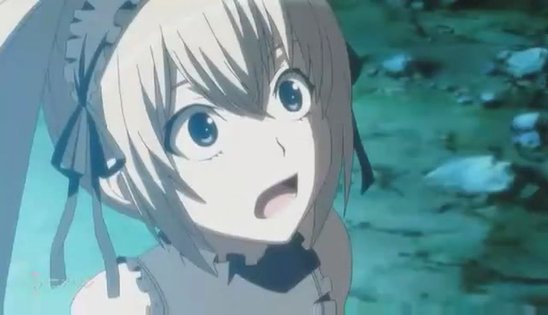
Just so you know, it takes a lot to surprise Katja.
I've only seen 22 episodes of Seikon no Qwaser, so its position in the ranking could change once the remaining uncensored episodes are subbed. [Update: Watched all 24 episodes. No change in the rankings. Looking forward to season two.] Remember how Queen's Blade was so bad it was good? Seikon no Qwaser is so bad that it's AWESOME. This show is amazing. It's unpredictable and consistently manages to impossibly one-up itself as its viewers gape slack-jawed in disbelief. Fullmetal Alchemist could take some lessons from Seikon no Qwaser regarding how to astound viewers with sudden plot twists and intriguing developments. As a bonus, Katja is also one of Hirano Aya's best roles ever.
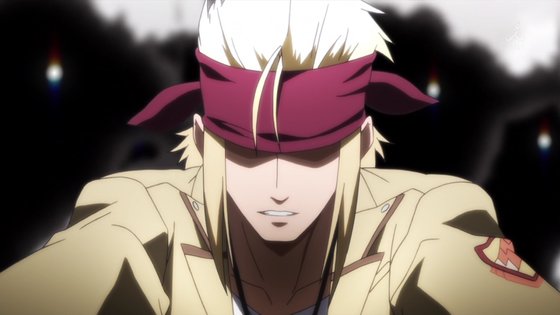
Angel Beats! never explained why TK was
trapped in Japanese high school purgatory.
Angel Beats! Now there's a show that's so bad that it's good. I'm sorry, I could not take a moment of this crap seriously. Nevertheless, it was consistently entertaining and it always inspired—by far—the most discussion of any show airing spring 2010, at least in the cynical IRC enclave I know best. Angel Beats! definitely proved a show does not have to be good to be fun. Unfortunately, I suspect I've now offended many of its fans who disagree with my view of the show. Presumably they have a higher tolerance for Jun Maeda traumadrama than I do.
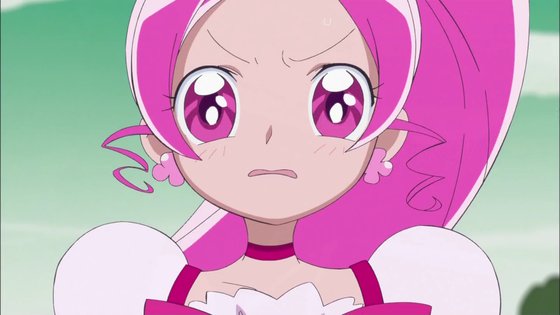
Cure Blossom, the worst Cure ever.
Heartcatch Precure is my least favorite Pretty Cure series thus far. I have two principal complaints about the show: First, Cure Blossom and Cure Marine are the weakest Cures of all time. I understand that's actually supposed to be a plot point, but it doesn't make them any more endearing. What it has done, on the other hand, is make me appreciate Cure Dream from Yes! Pretty Cure 5 a lot more. In her Nozomi guise, Cure Dream is a complete doofus and about as sorry as Tsubomi and Erika when it comes to day-to-day affairs. However, as a Cure, she's pretty solid, even if she does play for the Pretty Cure equivalent of a corporate softball team. Cure Blossom and Cure Marine, on the other hand, shouldn't even be playing in this league. Go back to the minors, losers. My second complaint about Heartcatch Precure is that the monster of the week is always bad feelings. Bad feelings? Really? Heartcatch Precure needs more Dark Precure—a lot more. I bet she doesn't have to take a God damn bus to go fight Pretty Cure when they're out of town.
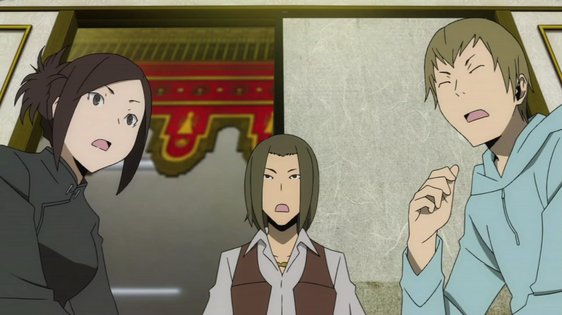
Erika without her hat might as well be naked.
I wanted to like Durarara!! but I couldn't stand Masaomi, Anri, or Mikado. This show would have been a lot more interesting had it been about the crazy stalker girl, the motorcycle cop, and hatless Erika. It's no Baccano!, that's for sure.
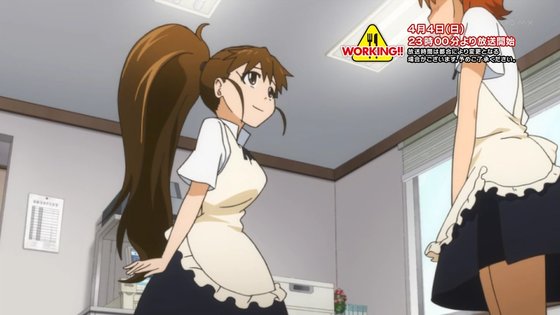
Squirrel-girls? They all suck too.
I dropped WORKING!! after the first episode because I didn't like any of the characters. Well, the only ones I actively disliked were the "minicon" dude and Popura, mostly because I'm tired of anime's obsession with small girls. I heard the show gets good later on, but I've got more Detective Conan to watch. Speaking of which, I didn't include Detective Conan in this lineup because I'm still hundred of episodes behind, but there's a chance you might see it in the summer 2010 wrap up in a few months.
Posted in Angel Beats!, B Gata H Kei, Durarara!!, Fullmetal Alchemist: Brotherhood, Heartcatch Precure!, Major, Mayoi Neko Overrun!, Season Summary, Seikon no Qwaser, WORKING!! | Tags: baseball, Dropped Shows, Harem Comedy, Hirano Aya, Jun Maeda, Mahou Shoujo, Moe Blobs, Plying Girls, Season Conclusion, Spring 2010, tsundere, Yui Horie | Permanent Link
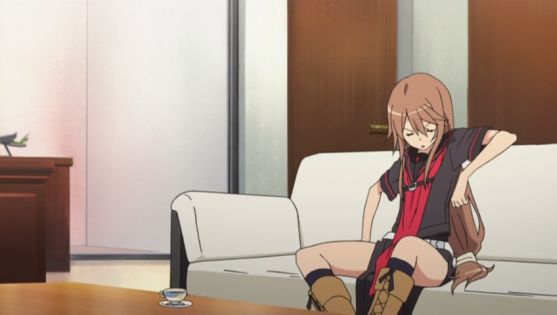
Nice lobster bib.
First, I fully expect Ookami-san to Shichinin no Nakama-tachi to be a J.C. Staff layup. It's got Yui Horie sweetness and, oh yeah, THE AYAKO DOCTRINE going for it at least. And the scenario seems interesting enough. As long as they don't Index it up, it should be okay.
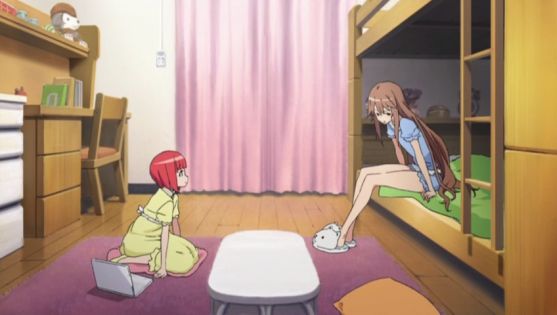
Looks like Ryuuji's and Taiga's kid attends J.C. Staff boarding school.
Second, Tall Taiga has legs that go up to her neck, and you're nuts if you think I'm going to pass up a chance lengthen my "legs that go up to her neck" tag count.
Posted in Ookami-san to Shichinin no Nakama-tachi | Tags: AYAKO DOCTRINE, Legs that go up to her neck, Summer 2010, Yui Horie | Permanent Link

At least there's no spinning watermark.
Although I own all the DVDs, I chose to re-watch my archive of Love Hina fansubs over the past few months. As you might expect, the video and audio quality is atrocious by modern standards, with 320x240 15fps encodes being the norm. (The entire season fits on two CD-Rs.) Depending on the group, the subtitles themselves can also be quite poor by today's standards. Many lines are poorly timed and some episodes were clearly finished by non-native English speakers. Every single episode was generally inferior from a technical perspective than the samples in my recent Chu-Bra!! PSP experiment. Nevertheless, Love Hina in this crude form invokes a certain nostalgia when remembering the brief, recent history of anime distribution in America.
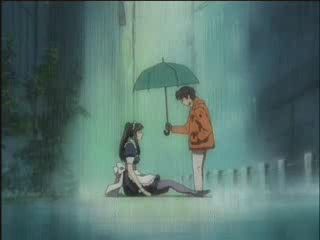
Try a little tenderness, Keitaro.
Love Hina was one of the first shows successfully distributed widely in entirely digital formats. Although the initial rips came from analog broadcasts, the Internet (and sneakernet) distribution of Love Hina episodes was accomplished digitally. Heretofore, American anime fans typically purchased, traded, or copied videotapes of fansubs. This is how I first watched All Purpose Cultural Cat Girl Nuku Nuku, for example. For those unfamiliar with the medium, videotapes are purely analog, so the quality degrades significantly after each generation. If you were lucky, you got to watch something that was low enough on the copy-of-a-copy-of-a-copy chain that it did not look like mush.

Aneue > Onee-sama.
What a long way we've come in merely a decade. Fansubs today appear with soft-subs that can be turned off and video quality that surpasses DVD limitations by a large margin. No wonder the anime DVD bubble collapsed so quickly. I, like many buyers, contracted my buying habits once DVDs became clearly inferior to recordings of initial broadcasts—waiting for Blu-ray releases. I'm still waiting. FUNimation is taking cautious steps, but I won't be cajoled long by lackluster upscales.
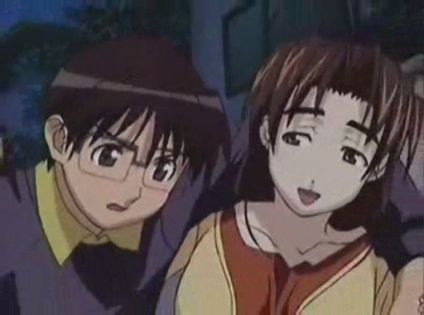
Keitaro's dilemma at the end of Love Hina is not
unlike Shinji's struggle with Instrumentality.
So what about Love Hina itself? Many former fans have recanted their affection for the title, disclaiming, "I hadn't seen much anime at that time, so I didn't know better." I still find Love Hina as charming and funny as ever. It balances a winning combination of absurd mechanized turtles and emotional resonance. It's a relic from a time of the big-boobed tsundere (before the stereotype turned into a complete joke), to be sure, and its harem comedy roots were unoriginal even then, but its cast remains engaging. Megumi Hayashibara is still absolutely dead-on as Aunt Haruka, and a round or two with Motoko reminds me how sorely Asakawa Yuu is missed. Likewise, the motif about promises still rings true today; it carries more import than the typical canned motivations anime characters generally spout. And perhaps it also implores viewers to remember a past they once loved and should not forget.
Posted in Loot, Love Hina | Tags: Harem Comedy, Hime Cut, History, Megumi Hayashibara, PSP Experiment, Try a Little Tenderness, tsundere, Yui Horie | Permanent Link
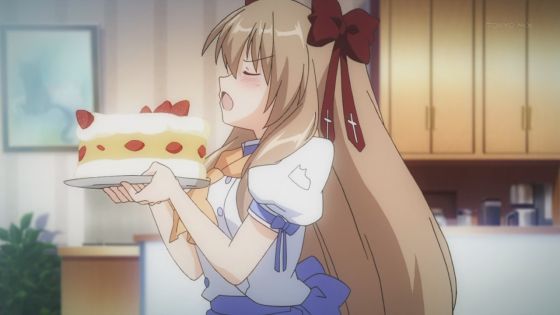
Fumino may or may not want you to have cake.
Why would I watch something that's awful? I watch Mayoi Neko Overrun! because it is bad, but inoffensively bad. Maybe "mediocre" is more apropos than "awful." Mayoi Neko Overrun! does nothing especially well, but it is so by-the-numbers there is not necessarily anything particularly odious about it either. It's an unnecessary show in the sense that its absence from the anime landscape would not be missed, but it is a colorful bit of filler that fits well during hollow moments where one might care for background amusement. Watching Mayoi Neko Overrun! is the anime equivalent of eating a stalk of celery in the afternoon because there's nothing else in the fridge and it makes a nice crunching sound.
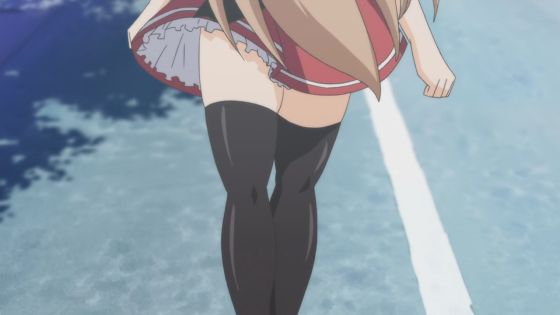
Breaking from tradition, Female Protagonist does not have a thigh_gap.
But really, Mayoi Neko Overrun! does not have a lot going for it. I don't care about the characters. I don't care about the story or the plot, and I am not even impressed by the fan service. The only thing about Mayoi Neko Overrun! I can positively identify as being something I enjoy is the way Fumino talks. I don't mean I like the sound of her voice. I also don't mean I enjoy her seiyuu's acting ability. I mean I like the cadence of her speech.
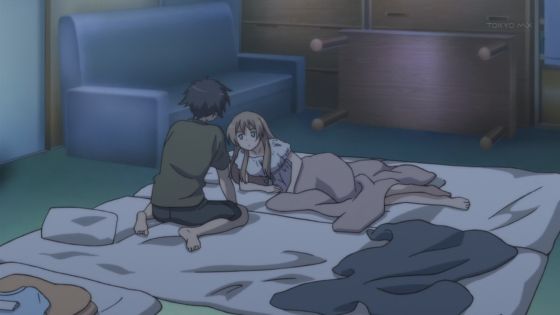
At least he didn't wake her shoving his crotch in her face.
Now, I'm not counting when Fumino does her tsundere shtick (although her "harrumphes" are also nicely done). Haruka Tomatosauce did the by-the-book Kugimiya-type tsundere a lot better when she was voicing Ayame in Asu no Yoichi! It doesn't get any more precise than that. (Ayame was so textbook neo-classical tsundere in Asu no Yoichi! she was even better than Kugimiya Rie herself.) But when Fumino is talking in her normal voice saying normal-type things, there is a nice rhythm to her words, even if they're ultimately empty and meaningless and completely forgettable. Y'know, like beat poetry. It's just good enough to make Mayoi Neko Overrun! watchable when there is nothing else on, and I bet it's even better with some creamy peanut butter.
Posted in Asu no Yoichi!, Mayoi Neko Overrun! | Tags: Hair, Haruka Tomatsu, Kugimiya Rie, Moe Blobs, Spring 2010, tsundere, Yui Horie | Permanent Link
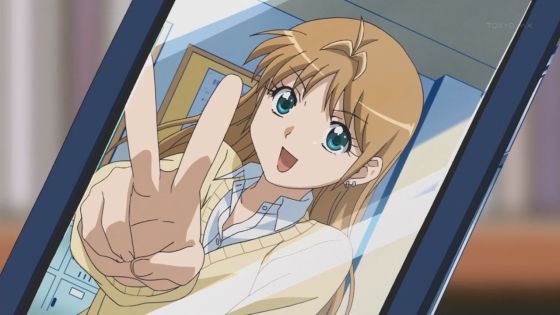
Tiny pictures are the way of love, Yamada.
I had extremely low expectations of B Gata H Kei and only watched the first episode as a goof. Pleasantly surprised, it looks like be watching more because this first episode is brilliant. I knew the basic premise of the show's 4-koma roots: sex-crazed virgin high school girl ends up pursuing monogamous relationship with Potato Guy. It's a stupid or wonderful premise depending on your point of view, but either way it's hilarious in execution.
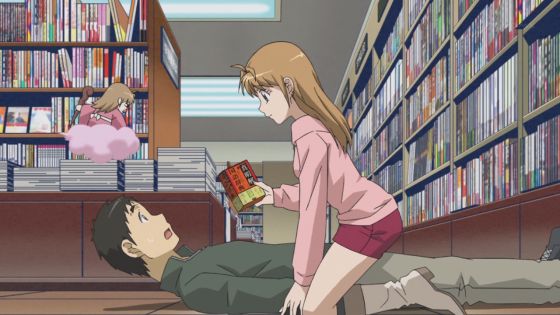
Kosuda is lucky Yamada didn't want a bigger dictionary.
Like Divine, I had initial reservations about Tamura Yukari voicing the lead girl, but she's perfect. It turns out B Gata H Kei is basically Ranpha ~The Early Years~, so Yukarin's high-school-Ranpha voice is sex-comedy perfection here.
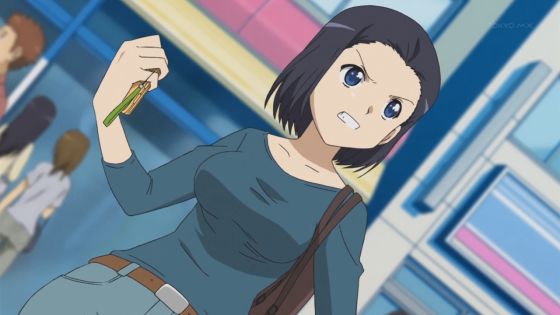
I was much less surprised by Horie Yui's character than Noto Mamiko's.
In light of my low expectations for Spring 2010, discovering B Gata H Kei is hilarious is a very welcome surprise. Of course, your mileage may vary; comedy is a tricky thing. In my view, the most important factor is timing, not material. Since the comedic timing in B Gata H Kei has been spot on, the show works for me.
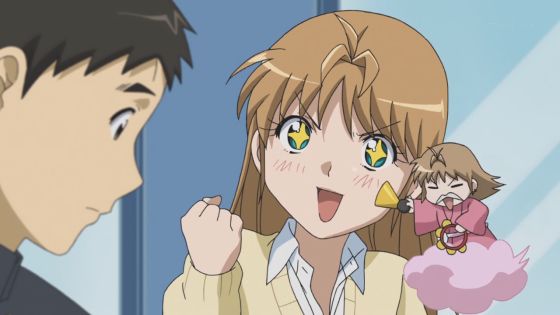
Whatever they're paying Yamada's Sex God it's not enough.
More accurately, its first episode works for me. However, I've watched too much anime to judge a show's merits entirely on its first episode. That path is quite precarious. Even a good show can lose its viewers if the follow-up episodes of a series depart substantially from expectations created by a strong first episode. Consider how many people felt betrayed after the incredible first episode of Futakoi Alternative.
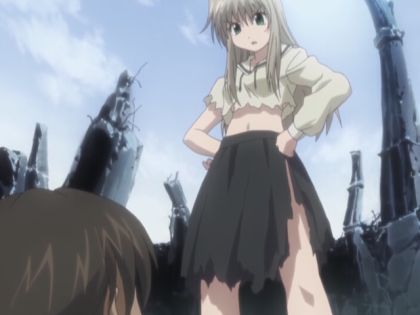
Sara finds Rentarou.
Taken in its entirety, I view Futakoi Alternative as an excellent series (even more so if you've ever watched any of the dreadful original Futakoi), and I rank its amazing first episode among the best—if not the best—first episode of anything ever, but that first episode is also incredibly misleading. Many viewers soured after the frenetic first Futakoi Alternative episode gave way to contemplative (and somewhat downer) follow-up episodes.

That is one really firm size chart/scorecard.
B Gata H Kei has a great first episode, but I hope the rest of the B Gata Heckler & Koch anime isn't a letdown. Like I said, comedy is a tricky thing. However, as long as Yamada keeping putting out Sawako-with-a-libido vibes each episode I won't even care if she doesn't manage to make 100 friends with benefits. I heard there's no guarantee she'll go to heaven even if she does kill 108 dudes. [Spoiler.]
Posted in B Gata H Kei, Futakoi Alternative | Tags: Built for Sin, Comedy, First Episode, Mamikore, Plying Girls, Sex, Spring 2010, Tiny Pictures Are the Way of Love, Yui Horie | Permanent Link

Oh God. Ueda Kana
has TWO devilcats.
I follow three basic types of seiyuu blogs: Self portraits, corporate, and food. Among seiyuu self-portrait blogs, Inoue Marina seems the most adept. Compared to, say, Akiyama Nana, the easy-on-the-eyes idol who voiced Makina from Shikabane Hime, Inoue Marina manages interesting composition and framing in her self portraits, while Akiyama Nana consistently relies on the same trademark pose except with different outfits. Corporate seiyuu blogs such as Hocchan's and Banana Mizuki's can be identified by the mere fact most of the photographs are taken by third parties. Seiyuu food blogs contain, well, daily pictures of whatever it is the voice actress happens to be eating. Among seiyuu food blogs, Ueda Kana is without peer. From the looks of it, nobody eats as well as she does. Nobody. UEDA KANA ALWAYS WINS.
Posted in Seiyuu | Tags: Akiyama Nana, Banana Mizuki, Food, Inoue Marina, Ueda Kana, Yui Horie | Permanent Link
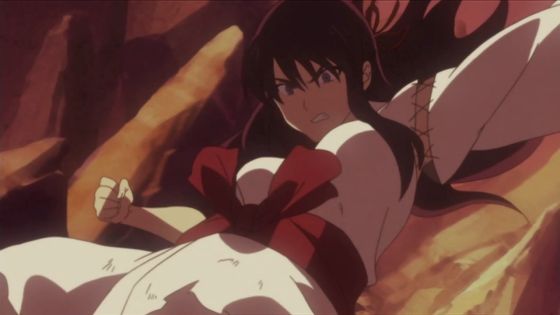
Gainax Kick detected.
The biggest surprise of the Winter 2009 season was the rise of Shikabane Hime: Kuro and the fall of Toradora! in the final rankings during the last weeks of the season. As expected, it was a rather weak season overall, but it had its moments.
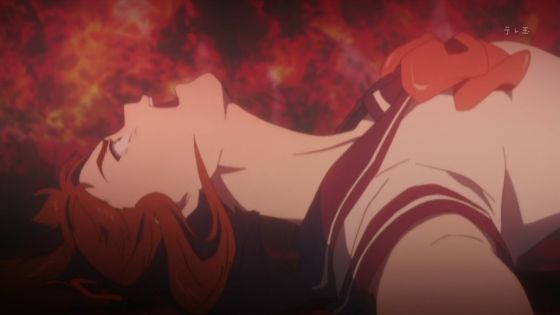
Makina has a bad day.
I had fully expected to drop Shikabane Hime after four episodes during the Autumn 2008 season, but I was hooked by the characters (except for Ouri) and the mystery. It helped I was spared the loathsome shounen jive conventions I despise so much.
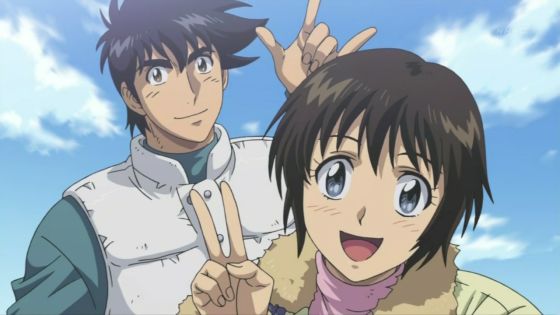
I hereby nominate Shimizu for Best Girl of the Year.
The second-best series from Winter 2009 was the first half of the fifth season of Major. Besides being a solid sports anime, it's also starting to delve into relationship drama, although with its own flair, and thankfully without the typical animeisms that plague relationship stories. Maybe it's because the characters in question are no longer in high school, so they aren't expected to act like twits. Whatever the reason, it's refreshing.
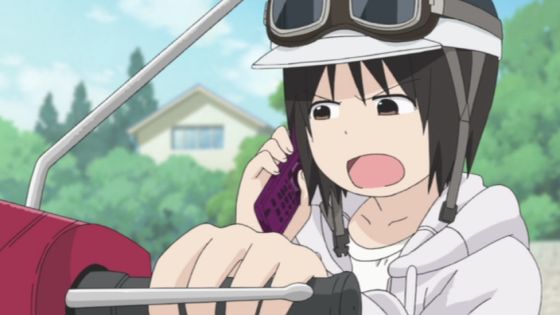
Nobue calls these days "weekdays."
Taking the third spot is the first Ichigo Mashimaro Encore OVA. I should probably not include OVAs in these rankings for numerous reasons, but I'm making these rules up as I go along. As for the first Ichigo Mashimaro Encore OVA itself, it was another solid block of entertainment and charm that make the series so enjoyable. Pity the title unfairly carries with it all that baggage it can't seem to escape. You know what I'm talking about.
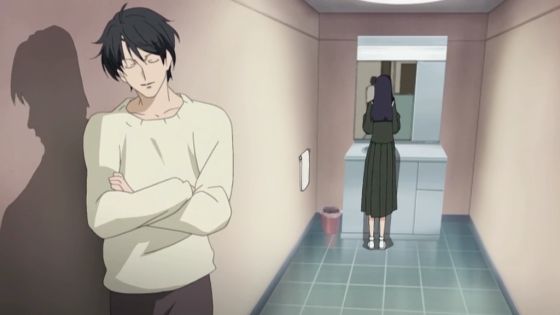
This is the weirdest bathroom. Is it at the end of a hallway?
In fourth is the latest offering of Maria-sama ga Miteru. I didn't care for these episodes as much as the previous seasons, but that's probably because of their Touko-centric nature. On the other hand, these episodes also elevated Touko three positions in the Marimite rankings. Congratulations, Touko. I no longer like you least.
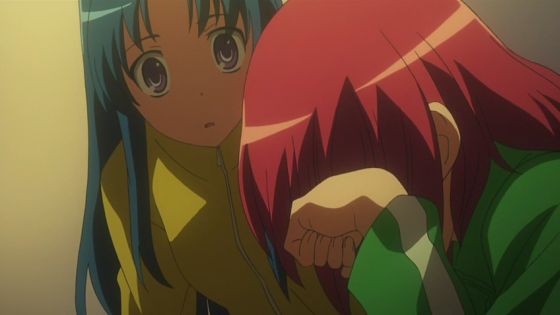
Ami is stunned to discover she's the Toradora! Best Girl after all.
And how odd. Minori is usually much more genki.
Everyone else's favorite, Toradora!, only managed to take the fifth spot, despite leading most of the season. As astute readers surely realize, this sudden drop is largely due to the dramatic turn towards the end of the season. Most people who really like Toradora! seem to really like the relationship drama aspects of the final episodes, but I felt they were ham-handed at best. Maybe it's because these are high school relationships in question, but I couldn't help thinking the principals were utter twits. As others have pointed out, this isn't really drama; it's melodrama. And it tastes like high school.
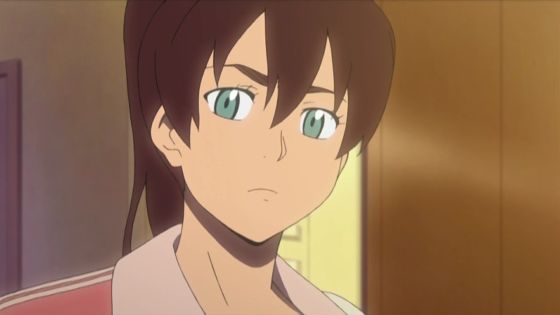
How odd. Shion is usually much more genki.
I'm not a huge fan of Tetsuwan Birdy Decode, but it is pretty good at what it does. Were these rankings based solely on my interest, it would probably place lower in the standings, although at no fault of its own. Then again, if these rankings were driven by my appreciation of Chiba Saeko, it would place higher. So let's just call it a wash, eh.
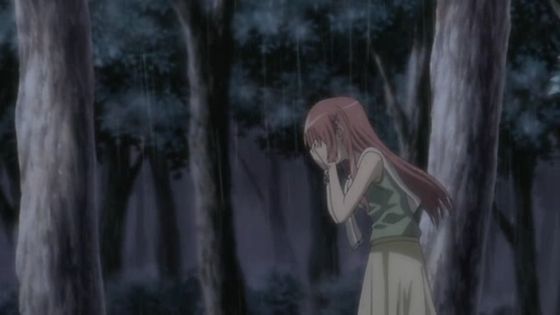
How odd. Kotori is usually much more genki.
Da Capo If is another OVA ranked entirely on the strength of a single episode. Like with the Ichigo Mashimaro OVA, that's probably not fair, and I should probably exclude it entirely, but I waited a long time for a Kotori route, so I'm going to include it, God damn it. Also, Da Capo If reminds us Horie Yui can really act when she wants to.
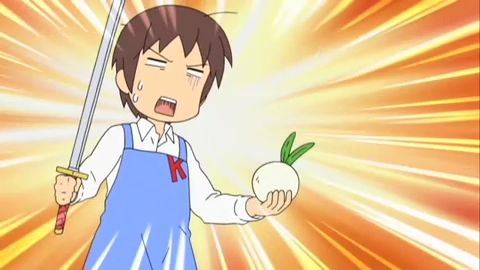
Kyon, you know this can't possibly end well.
The Melancholy of Haruhi-chan shorts are genuinely amusing. They pulled away from their Nyoron Churuya-san counterparts with that episode where Asahina Mikuru just starts crying from confusion and never looked back.
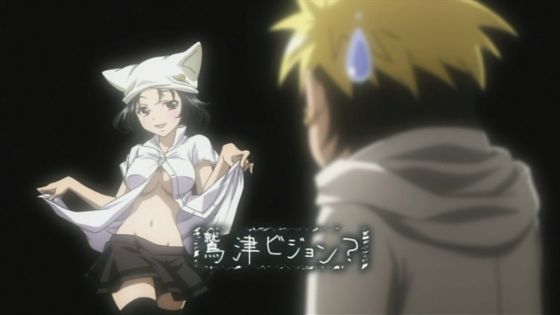
Washizu Vision?
Oh God. Asu no Yoichi!. Hey, some of the middle-laterish episodes are all right, and that running gag with Washizu's crony had a great payoff that came completely out of left field. The best part is everyone else dropped this show after episode two, so they have no idea what I'm talking about.
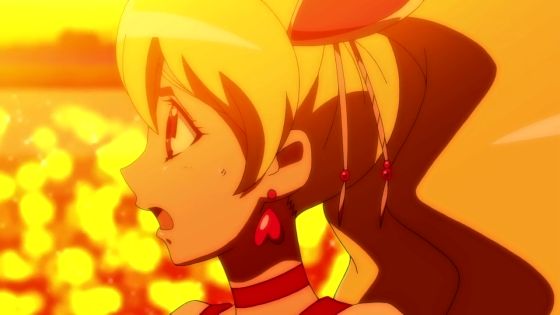
How odd. Love is usually much more genki.
Fresh Pretty Cure is fresh. Love is love. Tart is the least annoying Precure mascot thus far. Kaoru-chan probably wants to get into the girls' pants. Easy is the best Precure villain except for that that one movie where Cure White is tempted by the dark side and beats Hell out of Cure Black. Aside from Buki being a sort of useless religious fanatic, this show is all right.
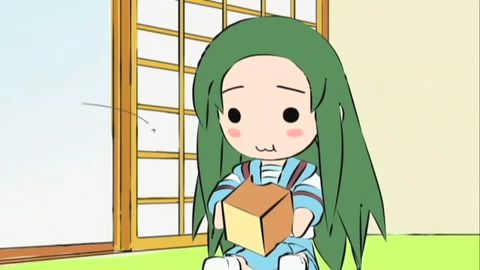
Quit while you're ahead, Tsuruya.
Nyoron Churuya-san needs more variety in its jokes, nyoron.
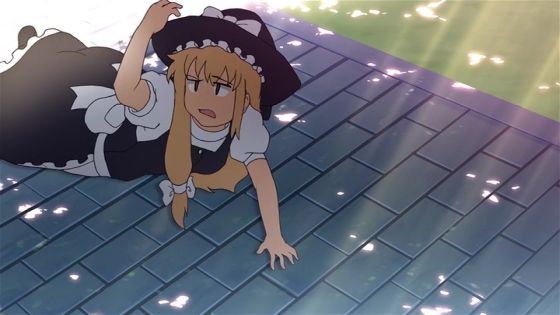
I've decided Marisa is my favorite Touhou character. Entirely arbitrarily.
Rounding out the final spot among shows I watched during the Winter 2009 season is the unofficial Touhou doujin anime. Despite all the hype, it was merely adequate, which I guess is pretty good all things considered. I wanted to like it more, but I can't claim it's even as good as the classic Yakumo/Chen bit with the KCY and all.
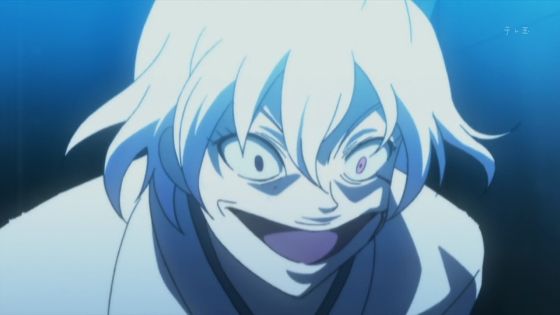
How odd. Hokuto is usually much more...wait, no she's not.
I also dropped a bunch of shows, but there aren't any additions or changes from the earlier list
Posted in Asu no Yoichi!, BEST GIRL, Da Capo If, Fresh Pretty Cure, Ichigo Mashimaro, Major, Maria-sama ga Miteru, Melancholy of Haruhi-chan, The, Nyoron Churuya-san, Season Summary, Shikabane Hime: Kuro, Toradora! | Tags: baseball, Chiba Saeko, Fan Service, Gainax, Gainax Kick, Girl of the Year, Girl of the Year 2009, Girls With Guns, Harem Comedy, J.C. Staff, Legs that go up to her neck, Mahou Shoujo, Movies and OVAs, Season Conclusion, Winter 2009, Yui Horie | Permanent Link
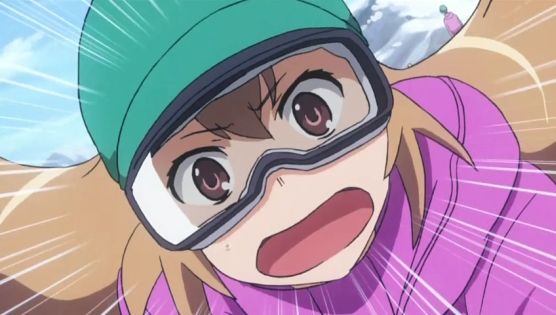
I really wasn't expecting an Ayu cameo.
I had moderate praise for the first half of Toradora! However, I also implied it wasn't as good as Honey and Clover. Others disagreed, again invoking Honey and Clover. After 21 episodes, I still believe Toradora! is the best series of the current season, but I maintain that it is still not nearly as good as Honey and Clover.
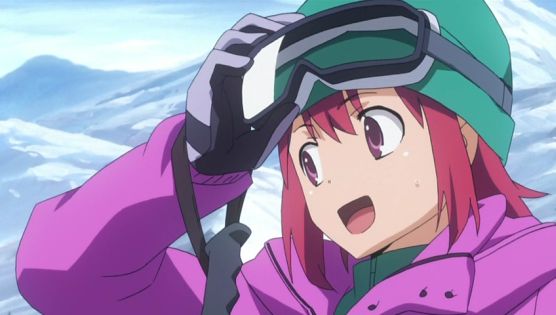
Minori is still the Best Girl, but I might just be saying that because
of Yui Horie. And because she throws right, bats left.
This is not meant as a slight against Toradora!, as it is still quite enjoyable. It rises above the conventions of its idiom and exceeds the assumptions and expectations I had for the series. I thought I knew what Toradora! was going to be about, and I thought I knew how the plot was going to play out, but thankfully J.C. Staff still has a few tricks up its sleeve, and keeps Toradora! from languishing in the morass of high school love comedies that plague anime. Nevertheless, although Toradora! is much better than I expected, it still suffers from a number of potentially damning flaws.
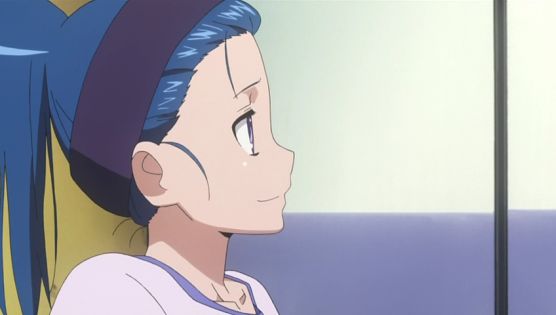
It's hard to deny Ami, though. Ami is awesome.
[Warning: Minor spoilers hereinafter for episode 21. Nothing you wouldn't have easily guessed by now, though.]
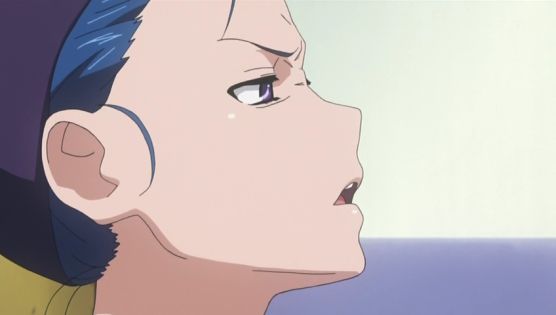
Back away from Ami.
First—and let's be honest here—Toradora! is still a harem comedy. It's not your typical harem comedy because Ryuuji isn't a spineless tool, but although decent male protagonists are rare, they are not unknown among harem comedy males. Kazuya from Hand Maid May comes to mind, and if you're willing to characterize School Rumble and Nadesico as harem comedies (look, not exclusively, but they still are), then Harima and Akito qualify as well. But the problem with harem comedies is that most of the romantic tension is defused. The question isn't if Male Protagonist will get together with someone, but when. Usually, with whom isn't even an issue, as the First Girl He Sees Clause proves quite reliable in this respect. At this point in Toradora!, Ryuuji has three viable love interests. The remaining drama in the show boils down to which girl he will pick, and what is to happen to the rejected. That the answer is not entirely obvious at this point (although smart money should heavily favor the worst girl) lends credit to Toradora!
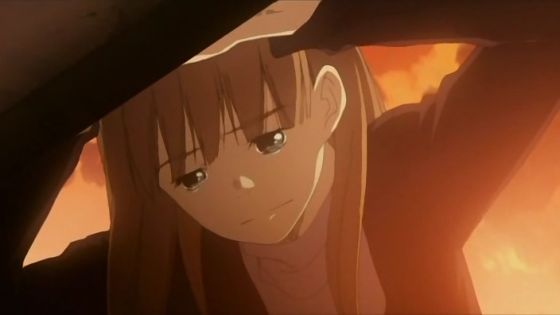
Even Ami can't compare with Yamada, though. Poor girl.
Compare this with Honey and Clover. The earlier J.C. Staff production offers multiple story lines regarding unrequited love. In each case, there is no assurance the characters in question will find love and happiness. Quite the contrary, for the most part, their romances seem more doomed with each passing episode. It is this balance of hope and despair that drives Hachimitsu to Clover.
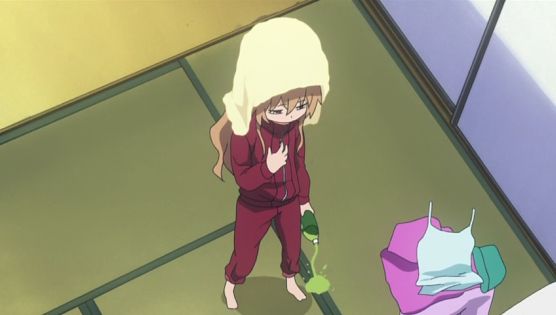
Taiga? She's a frickin' slob.
Technically, all harem comedies include tales of unrequited love as well, at least regarding the girls not chosen. But harem comedies lack the aforementioned despair component, as Male Protagonist could surely offer each of the girls his love were it not for Simple Contrivances and General Spinelessness. Perhaps more importantly, harem comedies also focus on the object of everyone's affection (i.e., the male lead), which changes the dynamic entirely unless the show also includes a primary love interest within the harem for Male Protagonist to actively and indefatigably pursue with incorruptible loyalty despite no assurance of potential dere-dere B.S. reciprocation.
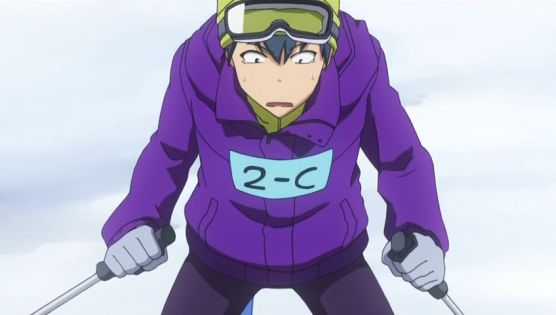
Ryuuji isn't an ass clown, but he's still kind of a putz.
Make no mistake. Toradora! is told from Ryuuji's point of view. Because of this, Toradora! is ascendant during episodes and moments when he is obsessed with Minori. Likewise, the unrequited love stories of the other characters elevate the show as well. But after episode 21, I am hard pressed to imagine the series avoiding a sharp dive in quality unless it takes the courageous route by taking the story in unexpected directions. I'm hoping for this (presumably crueler) ending to Toradora! It is not a happy way to wrap up the series, but it is the respectable way to go, and it is a damn sight better than the ending episode 21 is apparently establishing. Quite frankly, though, I fear J.C. Staff does not have the sand for it. To do so, it will have to make a lot of "shippers" unhappy and disappoint a lot a viewers. It will make for a better show—too late to catch Honey and Clover, but perhaps sufficient to avoid stumbling before Shikabane Hime should Kuro finish unexpectedly strong. (It's Gainax. You can't count that possibility out. Maybe it'll end like Mahoromatic, but perhaps it will end like Top wo Nerae.)
Posted in BEST GIRL, Honey and Clover, J.C. Staff, Toradora! | Tags: First Girl He Sees Clause, Harem Comedy, Yui Horie | Permanent Link
|
|












